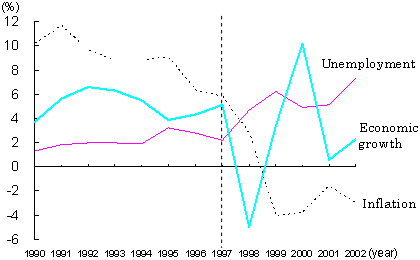Hong Kong has been dealt a heavy blow by severe acute respiratory syndrome (SARS). However, the truth is that the Hong Kong economy has been witnessing a turn in its fortunes ever since its reversion to China in 1997, long before the SARS outbreak. Average annual economic growth in the five years since reversion has been about 2.5 percent - a far cry from the 5 percent that was seen in the five years prior to 1997. Conversely, unemployment, which stood at 2.2 percent in 1997, has surged to currently stand at 7.5 percent. In addition to a series of external shocks such as the 1997-8 Asian financial crisis and SARS, the Hong Kong economy is being further hit by the decline of its predominance in intermediating China's international trade.
Hong Kong was reverted to Chinese rule on July 1, 1997, but unluckily, the Asian financial crisis broke out the following day triggered by the devaluation of the Thai baht. As a result, the economy rapidly deteriorated and prices started to decline. Deflation did not stop at just bringing down the prices of goods and services, but also hit assets. The sharp decline in housing prices, especially, led most households with mortgages to see their debts exceed their assets and dampened personal consumption. To add to this, as the government expanded fiscal outlays in an effort to eradicate deflation, so did its fiscal deficit balloon. Although the Hong Kong economy made a sharp recovery in 2000 by riding the wave of the global information technology boom, this did not last long, and growth was again stunted after the collapse of the IT bubble. Furthermore, the recession has deepened this year with the spread of SARS.
Meanwhile, although many Asian currencies were sharply devalued during the Asian crisis, the Hong Kong dollar has remained fixed at 7.8 HK dollars to the U.S. dollar. As a result of this overvalued currency, Hong Kong's competitiveness as an international business center has declined. So long as devaluation is ruled out as a policy option, Hong Kong must wait for a further decrease in wages and prices - in other words, continued deflation - to regain competitiveness and see economic recovery.
At the same time, the idea that the Hong Kong economy is secure as long as the Chinese economy develops smoothly is not as viable as it once used to be. In the initial stages of China's market opening, Hong Kong took advantage of its proximity to Guangdong Province, the forerunner in this process, to serve as the gateway to China. A healthy legal system and excellent infrastructure enabled Hong Kong to play this important role. However, with China approaching the threshold of full market opening, as symbolized by its entry into the World Trade Organization, the advantages that Hong Kong has so far enjoyed are losing their appeal. Thanks to the improvement in China's infrastructure, such as marine ports and airports, more and more foreign firms have come to prefer doing business directly with China, without having to pay the high admission fee for going through Hong Kong. In addition, on the legal front, once Chinese laws - which have been notorious for their lack of transparency and consistency - catch up with Western standards, multinational corporations targeting China would cease to bother with the trouble of setting up subsidiaries in Hong Kong.
In this way, the complementary relationship between Hong Kong and mainland China is waning, and they are gradually coming to compete more and more with each other. To regain its vigor, Hong Kong must offer more high-value added services by providing better human resources and infrastructure than what is available in major mainland Chinese cities such as Shanghai and Guangzhou. Promising areas include finance, distribution and tourism. Furthermore, Hong Kong must devalue its currency to eradicate deflation and improve its ability to compete with international prices.

(Source)Based on official Hong Kong statistics


